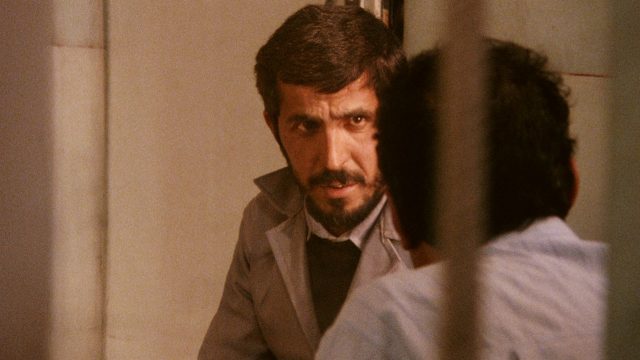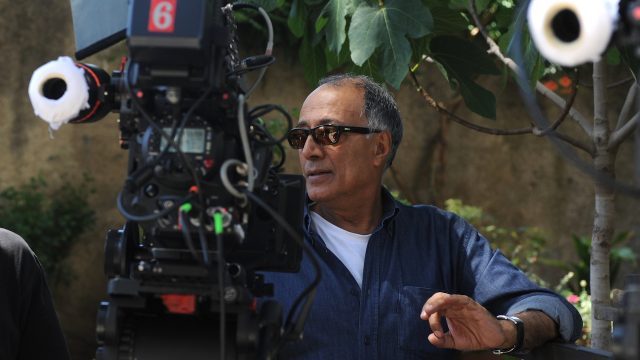
Hossain Sabzian has to explain why he impersonated Mohsen Makhmalbaf in Abbas Kiarostami’s Close-Up
CLOSE-UP (کلوزآپ ، نمای نزدیک) (Abbas Kiarostami, 1990)
IFC Center
323 Sixth Ave. at West Third St.
Wednesday, August 7, 7:50, Saturday, August 10, 1:10, Monday, August 12, 1:05, Tuesday, August 13, 7:30
Series continues through August 15
212-924-7771
www.ifccenter.com/films/close-up
 In his 1996 short Opening Day for Close-Up, Italian actor-writer-director Nanni Moretti plays a theater manager preparing to show Abbas Kiarostami’s 1990 masterpiece, Close-Up. As the first screening approaches, he worries about the parking situation, the size of the ad in the local paper, the specific angle the projectionist is using, the precise minute when the film should start, how it’s going to compete with big Hollywood blockbusters, and how one of his employees is handling phone calls. “The film is about the power of cinema. Let’s be a little more enticing,” he tells her. It won’t take much enticing to get people to show up at IFC Center to see Close-Up, which is screening August 7, 10, 12, and 13 in the exhaustive, comprehensive series “Abbas Kiarostami: A Retrospective.”
In his 1996 short Opening Day for Close-Up, Italian actor-writer-director Nanni Moretti plays a theater manager preparing to show Abbas Kiarostami’s 1990 masterpiece, Close-Up. As the first screening approaches, he worries about the parking situation, the size of the ad in the local paper, the specific angle the projectionist is using, the precise minute when the film should start, how it’s going to compete with big Hollywood blockbusters, and how one of his employees is handling phone calls. “The film is about the power of cinema. Let’s be a little more enticing,” he tells her. It won’t take much enticing to get people to show up at IFC Center to see Close-Up, which is screening August 7, 10, 12, and 13 in the exhaustive, comprehensive series “Abbas Kiarostami: A Retrospective.”
In 1989, Kiarostami read about a strange case that was unfolding: A man named Hossain Sabzian had been arrested for impersonating Iranian auteur Mohsen Makhmalbaf, convincing the Ahankhah family that he was Makhmalbaf and that he was going to make a movie with them in their house. Kiarostami immediately turned his attention to the story, meeting with Sabzian in prison, persuading judge Haj Ali Reza Ahmadi to let his crew film the trial, and getting all the participants, including Sabzian, Ahmadi, journalist Hossain Farazmand, and the Ahankhahs — husband and father Abolfazl, his wife, Mahrokh, and their sons, Mehrdad and Monoochehr — to allow themselves not only to be filmed going forward but to re-create specific scenes together. Thus, for example, Kiarostami restages Mahrokh’s initial encounter with Sabzian on a bus, where they talk about Makhmalbaf’s The Cyclist, and Sabzian’s arrest is also performed, complete with soldier (Mohammad Ali Barrati) and sergeant (Davood Goodarzi).

Abbas Kiarostami on the set of his 1990 masterpiece, Close-Up
It’s often difficult to tell what is happening in the present and what has been remade from the past, which is a significant part of the film’s charm. The trial scene is an eye-opener as we watch the Iranian justice system at work; Kiarostami shoots the scene with different equipment, resulting in a grainier texture. Part of the boom mic is often visible, further blurring the lines between fiction and nonfiction, reminding us that this is a film. Kiarostami also injects some pure poetry, most beautifully when the taxi driver (Hooshang Shamaei) picks a few flowers outside the Ahankhahs’ home, then kicks a green and pink aerosol can that cinematographer Ali Reza Zarrindast follows as it clinks noisily down the street. Close-Up is much more than a celebration of the power of cinema; it is a magisterial film about what makes us profoundly human. (You can find out more about Sabzian in Moslem Mansouri and Mahmoud Chokrollahi’s 1996 Close-Up Long Shot.) “Abbas Kiarostami: A Retrospective” continues through August 15 with such other films by the Iranian director as Through the Olive Trees, The Wind Will Carry Us, Taste of Cherry, Ten, and numerous shorts.